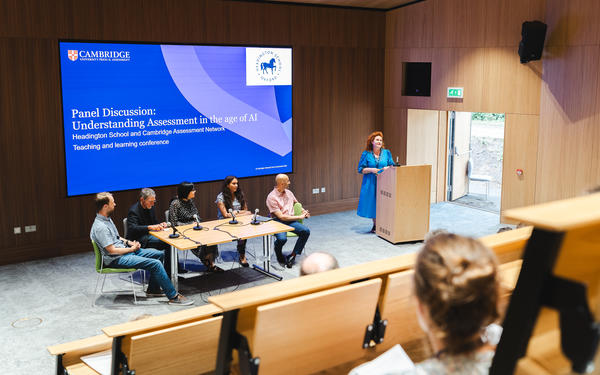News and Events
Understanding assessment in the age of AI
Teachers at a Cambridge conference learn that principles of effective teaching and assessment are key to managing the 'explosive' power of generative AI.

The ‘Understanding Assessment in the Age of AI’ conference explored how generative AI can be integrated into assessment and teaching.
Over 100 school leaders, teachers and assessment professionals at a conference organised by the Cambridge Assessment Network, in collaboration with Headington School learnt strategies to harness the power of AI.
Harnessing AI's explosive potential
Generative AI promises an explosion in stimulating and engaging content for young people and teachers – an explosion which can be harnessed and not simply ‘managed’ if organised by robust approaches.
Tim Oates, Director of Assessment Research and Development at Cambridge University Press & Assessment, joined a panel of education experts throughout the day’s event. During the conference, Oates delivered a presentation on: ‘Human elements of digital learning and assessment applications’.
Tim Oates explained: “Generative AI promises an explosion in stimulating and engaging content for young people and teachers – an explosion which can be harnessed and not simply ‘managed’ if organised by robust approaches – based on well-established evidence-informed principles from solid curriculum and assessment theory. The challenges of The New does not mean abandoning the aims and principles of high-quality education. Far from it, they allow practitioners to grapple with and actively shape the pressures which inevitably come from technological innovation."

We don’t (can’t) know the full AI timeline, or the endpoint: life of leisure vs terminator. But we do know that the principles of effective learning and assessment don’t change. Therefore, let’s play with the new AI tools available to us.
The panel comprised experts on aspects of AI in education:
- Dina Foster, Research Associate at EDUCATE Venture Research, who spoke on: ‘Harnessing the power of AI: How AI strategy can be used to address school priorities and transform teaching and learning’
- Dr Ourania Ventista, Online Tutor and Supervisor for the Cambridge Postgraduate Advanced Certificate in Educational Studies, delivered: ‘Teachers’ professional learning and its impact on students’ learning outcomes: Findings from a systematic literature review’
- Gwyneth Toolan and Alex Spencer, Product Manager and Data Scientist at RM Education, presented: ‘Using AI tools in teaching and assessment’
- Nick Chatrath, Managing Director of Artesian Transformational Leadership spoke on: ‘Leading in the age of AI’.
George Vlachonikolis, Assistant Head (Teaching and Learning) at Headington School and Cambridge Assessment Network Ambassador, said: “After listening to five very eloquent, enthusiastic and intelligent speakers, my notebook was full of ideas. We don’t (can’t) know the full AI timeline, or the endpoint: life of leisure vs terminator. But we do know that the principles of effective learning and assessment don’t change. Therefore, let’s play with the new AI tools available to us (teachers and students). And, as we play, let’s work out what we want the job share between AI and human intelligence to be, in order to best achieve those principles.”
“There is a lot to unpack here: the fear and uncertainty around AI, but also the necessity to lean into it. As educators, we should decide on the whys, hows and whats we want from these new tools (hence, the call to action: play with them) and not just be led by them."
A longstanding hub for technological advancements in education and research, Cambridge University Press & Assessment launched its AI research ethics policy earlier this year and has proactively provided guidance to teachers and researchers on effectively integrating generative AI technologies into assessments.
Learn more about how evidence-based research is shaping Cambridge digital assessments and read about ongoing developments in the Cambridge ‘Digital Mocks Service’.





